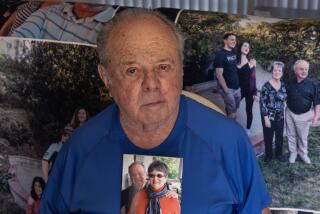Bobby Fuller’s mysterious death explored in new book
Texas guitarist and singer Bobby Fuller had barely found his way into the national limelight in 1966, with his group’s soon-to-be-classic reworking of a song first recorded by Buddy Holly’s band the Crickets, when he died mysteriously of asphyxiation in Los Angeles. He was 23.
It has remained one of rock’s strangest deaths — Fuller’s body was found in a parked car, apparently beaten and doused in gasoline — one that’s explored in a new book that takes its title from his biggest hit, “I Fought The Law: The Life and Strange Death of Bobby Fuller” (Kicks Books, $19.95).
------------
FOR THE RECORD
An earlier version of this post referred to “I Fought the Law” as a song first recorded by Buddy Holly. It was recorded by Holly’s band, the Crickets, after Holly died.
------------
The book is a collaboration between Fuller’s brother and bandmate, Randy Fuller, and Miriam Linna, the indie rock drummer who also has been running Brooklyn-based Norton Records with her husband Billy Miller for nearly 30 years.
They’ll be part of a book launch and signing party on Saturday afternoon at La Luz de Jesus Gallery in Hollywood, since it was here in Los Angeles where the Bobby Fuller Four’s career got off the ground, only to see everything vanish when Fuller died.
The death was ruled a suicide, but Randy Fuller and many people who knew Bobby never bought that story. There have been numerous theories over the years, some involving the mob, but few agree with the suicide idea.
“Who would pour gas on himself in a hot car?” Randy Fuller told the El Paso Times in 1998. “I just think he got in a bad situation that night, met the wrong dude and couldn’t get out of it. I’m 99.9% sure that it wasn’t an accident or a suicide.”
In the book, Fuller and Linna point out a coincidence that may be a contributing factor to the case: Longtime L.A. police Chief William H. Parker died of a heart attack two nights before Fuller’s body was found July 18, 1966, and in the hectic transitional period that followed, the investigation of Fuller’s death wasn’t considered a top priority.
Fuller was a well-rounded artist, one who built his own recording studio and produced his recordings, carrying forward much of the spirit of ‘50s rockers such as Holly (a fellow Texan) and Eddie Cochran. His original demo version of “I Fought the Law” has surfaced recently and is posted online. Some aficionados say they prefer it to the hit version, which was inducted into the Rock and Roll Hall of Fame.
The book’s launch also has been the occasion for the rediscovery of a previously unpublished interview of both Fullers for Hit Parader magazine. In that interview, Fuller talked about his vision of the band’s sound, his thoughts on the British Invasion and one of the items on his musical wish list.
“Our sound is West Texas rock ‘n’ roll with our touch. It’s a border sound,” he said. “I like the Beatles and the Animals …. I’d like to sit in with the Beatles to see if they’d excite me like they do on records, maybe play some songs they haven’t yet recorded and see what they sound like.”
Randy Fuller and the Bobby Fuller Four’s original drummer, Dewayne Quirico, will perform the group’s songs through the book launch event Saturday, then the Randy Fuller 4 will head to Burbank to play an evening gig on a bill with Chris Montez at Joe’s Great American Bar & Grill.
Follow @RandyLewis2 on Twitter for pop music coverage
More to Read
The biggest entertainment stories
Get our big stories about Hollywood, film, television, music, arts, culture and more right in your inbox as soon as they publish.
You may occasionally receive promotional content from the Los Angeles Times.











